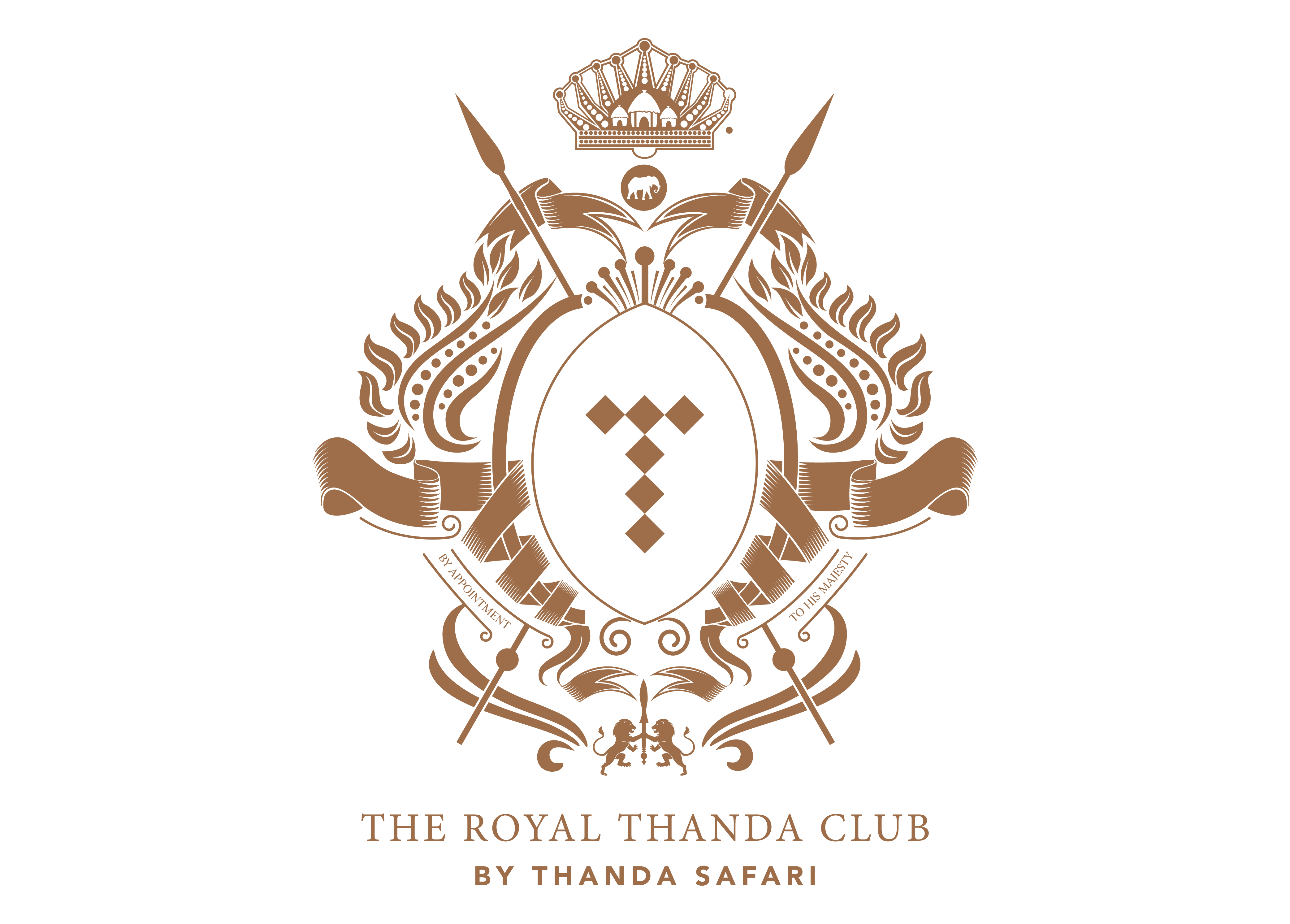The Zulu Cultural experience.
PEOPLE OF HEAVEN
Thanda means Love in the Zulu language and reflects the African concept of Ubuntu: that ‘a person is a person through other people’, or ‘I am because we are’. The ethos is that people develop their humanity by upholding, respecting and caring for the natural environment and fellow humans.
This ethos is part of the DNA of Thanda Safari which offers a truly exceptional Big Five safari that not only celebrates wildlife and the natural environment, but also traditional Zulu culture.
The Zulu people have always lived in this region. It was where legendary King Shaka Zulu once roamed, with his broad-bladed stabbing spear and his five-foot battle shield, made from the hide of the Royal Nguni cattle. In honour of this, Thanda Safari’s emblem is a royal shield flanked with elephant tusks. Time spent at Thanda Safari is a powerful, emotional, lifechanging experience, it is both a wilderness experience and a Zulu experience; something that is unique to the reserve.
You feel the power of the Big Five: the lion, leopard, rhino, buffalo and elephant and you learn about traditional Zulu culture at the same time. The Zulu people’s symbol for the King is the elephant and the lion. The elephant, ‘ndlovu’ in the Zulu language, means ‘the forceful one’; the lion or ‘ibhubesi’, means ‘to make the final decision’ as the lion is regarded as the King of the Beasts. The leopard, ‘ingwe’, symbolises all that is noble, courageous and honourable in the Zulu tradition.
Thanda Safari was opened in 2004 by the Zulu King, his Majesty Zwelithini Goodwill kaBhekuzulu who reigned over KwaZulu-Natal as head of state for 49 years
until March 2021 when he passed. Princess Nandi Zulu, the late King’s daughter, is Thanda’s royal ambassador and a powerful advocate for women being educated.
While at Thanda Safari you are invited to visit a Zulu homestead in one of the villages neighbouring the reserve, where you can engage with the people and find out about their lives and culture, and how they combine their traditions with 21st century living.
On the reserve where most of the staff are Zulu, you will be treated to the beautiful voices of Zulu women singing traditional songs and the warriors performing war dances as they have done since King Shaka’s days.
And, if you are planning your wedding, you can have the most unforgettable, Zulu-inspired wedding on Thanda, at one of our three sumptuous accommodation offerings or in the wild, under a Marula tree. The Zulu people refer to the Marula tree as the Marriage Tree. They believe that marriages held under this tree are divinely blessed.
An authentic experience.
When the Zulu women, known as the ‘Zulu Mamas’ sing traditional Zulu songs for the guests at Thanda Safari or when the Zulu warriors perform their war dances, there is absolute silence, awe and admiration. This is not just entertainment. The traditional songs, dances and exquisite attire are part of the rich, living Zulu cultural activities and celebrations in the rural communities of Zululand.
At Thanda Safari, a celebrated Big Five private game reserve in northern KwaZulu-Natal, most of the team members are Zulu. Zulu culture and the Zulu people are celebrated here and they, in turn, generously invite guests to experience how they live, their ancient traditions, and deep knowledge about wildlife and the environment.
People worldwide are so fascinated by Zulu culture that they seek out ‘Zulu safaris’ where they can combine an authentic Zulu cultural experience with a Big Five safari. This is precisely what Thanda Safari offers. Guests experience Zulu singing and war dancing, and are invited to visit traditional Zulu homesteads and engage with the people and healers in Thanda’s neighbouring communities.
Thanda Safari was officially opened in May 2004 by the Zulu monarch, the late King Zwelithini Goodwill kaBhekuzulu. He reigned as the eighth monarch of the Zulu people from 1971 until his death in 2021. As the protector of the Zulu nation, he took great pride in Zulu culture and travelled extensively as a global ambassador for South Africa and the Zulu nation.
King Shaka.
His ancestor was the legendary King Shaka, a great warrior and military strategist, who, by 1827, ruled over all of central Zululand – between the Black Umfolozi River in the north, and the Thukela River in the south.
A Big Five safari on Thanda is equally an immersion into Zulu culture and guests have an opportunity to meet Thanda staff members who have lived in this region for generations. One of them is Thanda Safari’s senior tracker, Bheki Ngubane who has been with Thanda Safari since it opened.
As a boy he herded his family’s goats and cows, and his father taught him about the natural environment and how to track wild animals. You can drop him off anywhere in the wild and he’ll quickly get his bearings. He knows all the plants and animals and he is phenomenal at spotting birds.
Bheki and all the trackers and field guides on Thanda Safari share many fascinating stories that offer a window into Zulu culture. The most important tree to the Zulu people, for example is the buffalo thorn, or ‘umLahlabantu’ in the Zulu language, which is believed to connect the living to their ancestors. King Shaka often referred to the buffalo thorn when imparting wisdom to his people about life and death. The tree’s thorns grow in opposite directions – one pointing forward and one pointing backwards – a reminder to look to the future but never to forget the past.
Enjoy the Zulu Culture.
For a Zulu experience in South Africa, Thanda Safari, a Big Five private game reserve in the heart of KwaZulu-Natal, is the destination of choice. Thanda means Love in the language of the Zulu people, and the remarkable legacy of the Zulu people is honoured and celebrated at Thanda Safari for the Zulu people are part of this land and the land is part of the Zulu people.
Thanda Safari’s ethos is one of wildlife and communities supporting each other.
The reserve partners in many different ways with the neighbouring Zulu communities, notably the Ngwenya, Mandlakazi and Mdletshe Tribal Authorities. Ninety percent of the reserve’s staff are from these communities, and Thanda regularly employs local choral and warrior dance groups, whose performances never fail to enchant guests.
The Thanda Foundation Trust.
The Thanda Foundation Trust is a fundraising vehicle that supports the preservation
of Zulu culture, and partners with several community projects, including the Inkanyiso Creche Programme for Zulu children in the community, and its flagship programme, ‘Star for Life’ – a unique educational initiative that has empowered over 500 000 young people in Zululand and southern Africa to pursue their education, live healthy lives and reach for their dreams.
Guests at Thanda Safari are invited to visit a Zulu village where each homestead traditionally has its own cattle and crops, and is ruled by the ‘umnumzana’ or homestead head. Cattle are an integral part of the spiritual, social and aesthetic lives of the Zulu people, and are named after birds, animals, plants and other natural or daily life phenomena.
On the reserve, the trackers and field guides share deep Zulu knowledge about the bush and all its creatures and plants. A majestic tree called the Natal Mahogany, for example is ‘uMathunzini’ in the Zulu language. It has glossy, dark green leaves and creamy green, sweet-scented flowers that attract bees and birds. In traditional Zulu medicine, the powdered bark is a popular remedy for stomach ailments, while a root decoction is used to treat fever. The leaves and fruit are made into a poultice to treat eczema. The seeds are soaked in water to make a delicious soup, often mixed with spinach.
Thanda Safari guests can take excursions to historic cultural sites of the Zulu people, such as legendary Battle of Isandlwana where the British imperial forces suffered one of their worst defeats at the hands of the Zulu warriors who fought with astonishing bravery in defence of the sovereignty of the Zulu Kingdom. British General George S. Patton Jr. said: “Wars may be fought with weapons, but they are won by men. It is the spirit of men who follow and the man who leads that gains the victory.”





